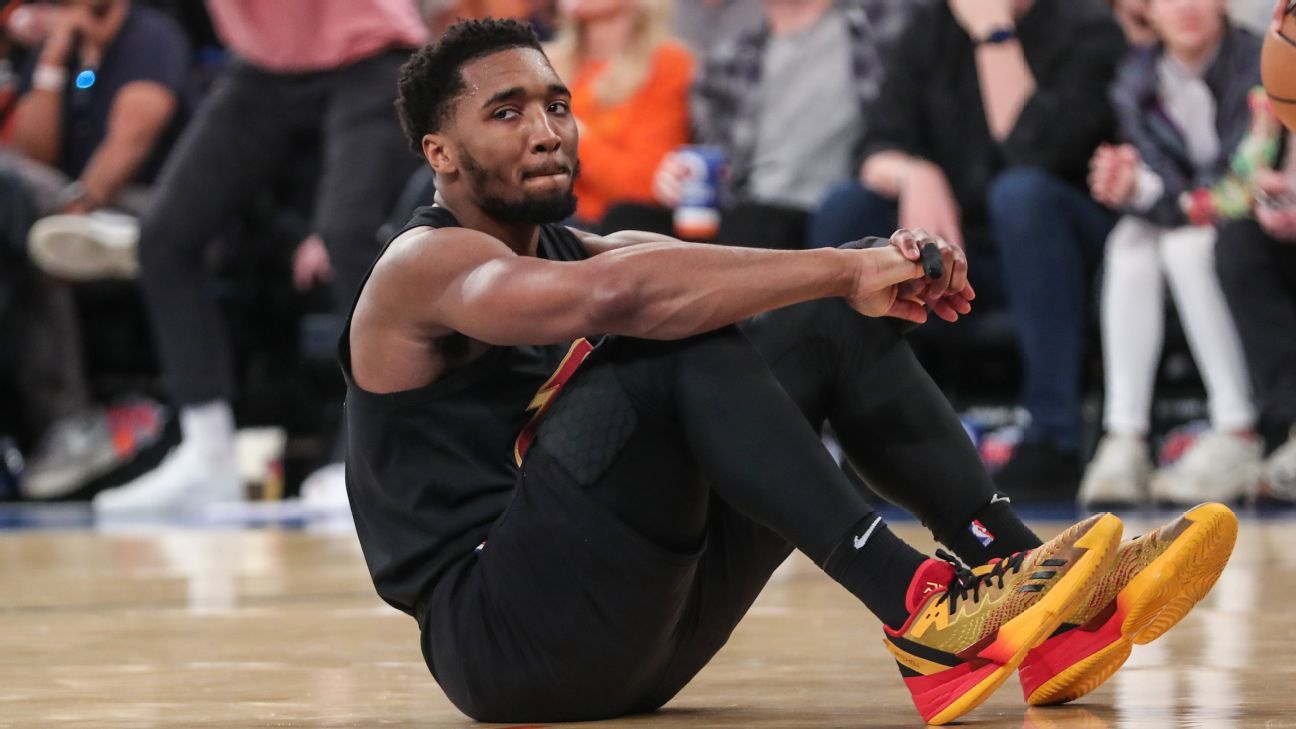New York Knicks fans spent the summer dreaming Donovan Mitchell would lead their team to playoff victories inside Madison Square Garden.
Mitchell was on the court for a pair of Knicks playoff victories at the Garden over the weekend — just not in the uniform anyone around the NBA expected.
After the Cleveland Cavaliers allowed the Knicks to take a 3-1 lead in their best-of-seven first-round series, Mitchell declared things would be different in Cleveland for Wednesday’s Game 5 (7 p.m. ET, NBA TV).
“I played like s—,” Mitchell said after shooting 5-for-18 in Sunday’s 102-93 loss in Game 3. “I’m the leader of this group. Everybody did their job, and I didn’t.
“It’s as simple as that, and we’ll fix it.”
But the Cavaliers aren’t returning to Rocket Mortgage Fieldhouse for what could be their final game of the 2022-23 season simply because of Mitchell’s struggles. A series of teamwide issues will need fixing if Cleveland wants to become the 14th NBA team to recover from a 3-1 series deficit to advance.
How Cleveland fell into a 3-1 hole
New York entered the playoffs as the league’s second-best offensive rebounding team, while Cleveland ranked 20th in defensive rebounding.
The Knicks have further exploited that advantage in this series, posting a 37.3% offensive rebounding rate — which is higher than any team has posted over a regular season since the Utah Jazz in the 2003-04 season. Despite Cleveland starting a pair of talented bigs in Evan Mobley and Jarrett Allen, the Knicks have controlled the paint, with Mitchell Robinson and the 6-foot-4 Josh Hart, who pulled in five offensive boards in Game 1, attacking the glass.
“It’s tough,” Allen said after Game 3. “I should be down there boxing out, pushing guys around more. It’s frustrating to see myself let someone get so many offensive rebounds.”
Meanwhile, the Cavaliers have floundered to a 101.3 offensive rating through the first four games of this series — worst in the playoffs and lower than any team over the course of a full season since 2015-16, according to NBA.com advanced stats.
Some of the scoring woes can be attributed to Mitchell and fellow star guard Darius Garland struggling to replicate their regular-season form. Garland was 4-for-21 in Game 3, while Mitchell shot 27.8% in Game 4 and recorded more turnovers (12) than assists (10) over his past two games.
As a team, the Cavaliers are turning the ball over on 3.3% of their passes, which is the highest rate in the NBA and would become the highest in a playoff series since player tracking began 10 years ago, according to Second Spectrum tracking data.
Why hope exists for a Cavs comeback
Despite falling behind in the series, Cleveland has found ways to create room for Garland and Mitchell to operate. There have been flashes of success running pick-and-rolls with the two guards, creating mismatches to expose.
Mitchell ranks second in points per direct pick among the 21 players who have run at least 75 pick-and-rolls during the postseason, per Second Spectrum tracking. Garland, for his part, had success running pick-and-rolls with Allen that drew Robinson away from the basket in the third quarter of Game 4.
“For me specifically, [the Knicks] threw a bunch of different things at me,” Mitchell said, “and sometimes it’s making the simple play, and trusting your teammates.
“Sometimes the ball just doesn’t go in the hoop, and you’ve got to find other ways to impact the game, and I just didn’t do that.”
Part of the reason Mitchell struggled at MSG, however, is the Knicks ignored whoever Cavaliers coach J.B. Bickerstaff played on the wing alongside his four stars: Mitchell, Garland, Mobley and Allen. Who Bickerstaff has leaned on to be that fifth player — Caris LeVert, Isaac Okoro, Cedi Osman and Danny Green — have shot a combined 16-for-59 (27.1%) from 3-point range, more than 10% below expected, per Second Spectrum.
“At the end of the day, we got to put the ball in the basket,” Bickerstaff said after Game 3. “We got to do a better job of creating opportunities for each other, and when we get these opportunities, we got to take advantage.”
One of the Cavs’ answers centers around what they shouldn’t do the rest of the way: put Garland on Knicks guard Jalen Brunson.
According to ESPN tracking data, Brunson went 4-for-7 when Garland was his primary defender in Game 4, averaging 1.25 points per play. When it was Okoro, Brunson finished 2-for-6, averaging 0.63 points per play. (For the entire series, Brunson is 8-for-14 — 1.18 points per play — when Garland is his primary defender.)
The Knicks aren’t infallible. They rank just 13th in offensive rating during the playoffs, ahead of the Cavaliers, on-the-brink Memphis Grizzlies and the eliminated Brooklyn Nets.
New York has gotten little from Julius Randle, who has struggled mightily since the first half of Game 1 while coming back from his sprained ankle late in the regular season. Sixth Man of the Year finalist Immanuel Quickley hasn’t made a shot in two of the four games. The Knicks are shooting a playoff-worst 27.5% from 3-point range.
On one hand, that would indicate the odds are in favor of New York having a breakout offensive performance.
On the other, it shows that, with modest steps forward, Cleveland can drag itself back into this series.
